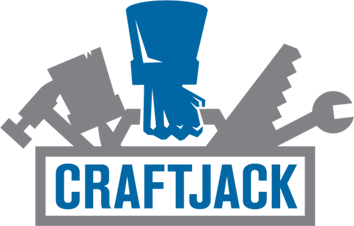Top 10 Financial Tips For Contractors
For contractors, positive business cash flow is critical for success. Follow these tips to keep your business in good financial shape.

As a contractor, you wear many hats. You have to provide excellent customer service, manage labor costs, market your services, and so much more. One of your most important roles, however, is that of financial manager. Even if you work with an accountant or bookkeeper, you need to know what's going on with your business finances, which involves reviewing financial reports, making financing decisions, and managing your expenses wisely.
If you've never handled business finances before, the responsibility can be a little overwhelming. Follow these tips to maximize your business cash flow and make your business as profitable as possible.
Get financial tips and more delivered to your inbox. Sign up for our newsletter.
1. Save Your Receipts
Whether you buy $2 worth of nails or $2,000 worth of equipment, it's important to save every receipt related to your business. When tax season rolls around, you'll need these receipts to determine how much you can deduct for business expenses. Receipts are also helpful for creating monthly profit-and-loss statements or determining if you need to raise your prices due to an increase in the cost of materials.
If you decide to keep paper copies of your receipts, invest in an expanding file folder that has at least 12 pockets, one for each month of the year. At the end of each day, check your pockets and take a look around your work vehicle to make sure you don't leave any receipts behind. File the receipts and put the folder in your filing cabinet or another safe place.
Paper files can be cumbersome, especially if you have hundreds of receipts to manage. If you're comfortable using a computer or mobile device, try one of the many digital organization tools on the market. You can scan receipts with a flatbed scanner and save them in a folder on your desktop, download an app specifically for receipt management, or take photos of receipts and upload them to the cloud. No matter which method you choose, it's important to back up your files regularly.
2. Understand Financial Statements
Financial statements provide important information about your company's performance, so it's important to understand how to use them. The income statement, balance sheet, and cash flow statement show different things, but reviewing all of them can help you understand if your company is on firm financial footing.
Income Statement
The income statement includes revenue, expenses, and profits/losses over a certain period of time. Revenue is the money you bring in, while expenses are the costs involved in running your business. If the difference between your revenue and expenses is positive, you turned a profit. If you spent more than you earned, you posted a loss.
Balance Sheet
Your balance sheet lists your assets, liabilities, and owner's equity. Assets are resources that are expected to generate some type of economic benefit for a business. Cash, machinery, inventory, and vehicles are examples of business assets. Liabilities are a company's financial obligations. If you took out a business loan and agreed to repay the bank, that's a liability. Owner's equity represents how much capital you could claim if you sold every asset and paid every liability. The balance sheet provides an overview of your assets, liabilities, and owner's equity at a specific point in time.
Cash Flow Statement
Business cash flow is the amount of money flowing into and out of a business. It can be classified as financing cash flow, operating cash flow, or investing cash flow. Financing cash flow refers to the movement of money between a business and its owners, creditors, or investors. Operating cash flow is the net amount of cash generated from business operations. Investing cash flow is the net amount of cash generated by investment activities, such as purchasing new equipment or selling assets.
The cash flow statement shows the movement of cash during a specific period of time. If you have more cash coming in than you do going out, your business has positive cash flow. Business cash flow is negative when more money is going out of the business than coming into it. Reviewing your cash flow statement can help you determine if you have enough cash to meet your existing obligations and invest in the future of your business.
3. Choose The Right Software
Even if you don't hire a full-time bookkeeper, you still need to use some kind of bookkeeping software to keep track of your revenue, expenses, cash flow, and profits or losses. What is bookkeeping? It's an accounting process that involves recording financial transactions. Many people use the terms accounting and bookkeeping interchangeably, but there are some key differences.
Bookkeeping Vs. Accounting
Bookkeepers focus on the day-to-day recording of financial transactions. Depending on the company's needs, a bookkeeper may also do bank reconciliations or correct invoicing mistakes. Accountants use the information entered by a bookkeeper to create financial statements and help a business owner make decisions about the future.
Good bookkeeping software makes it easier for contractors to send invoices, track their income and expenses, and prepare financial reports. If you're a sole proprietor, you may want to start out with free bookkeeping software and then upgrade to something with more features once your business starts turning a profit. When you're ready to upgrade, look for a program that fits your budget and has as many features as you can afford. QuickBooks, FreshBooks, and Xero are some of the most popular options.

4. Plan Ahead For Tax Season
Many contractors make the mistake of waiting until the end of March to start thinking about their taxes. Waiting until the last second can lead to problems, especially if you need help completing your business tax return and have to wait a few weeks to get an appointment with an accountant. If you already have an accountant, they may even charge extra if you wait to drop off your financial records and expect them to complete your return by the filing deadline.
Here are a few tips to help you plan ahead for tax season:
- Review last year's tax return. If your accountant pointed out any issues, review their comments and find out what you can do to avoid the same problems this year.
- Keep in touch with your accountant. You may want to set up a quarterly call to discuss your tax situation and plan ahead for April 15.
- Enter financial information into your bookkeeping software as often as possible. Waiting to enter six months' worth of data right before the filing deadline can lead to unnecessary stress.
- Make quarterly tax payments, if required. On-time payments can help you avoid penalties when you file your annual return.
- Ask your accountant if you can take advantage of any new credits or deductions.
5. Manage Expenses Carefully
To increase your profit, you can reduce your expenses, increase your revenue, or do a little bit of both. Managing your expenses carefully allows you to keep more of what you earn and weather the slow periods when revenue isn't as high as usual. To keep expenses in check, set a budget for each job and stick to it as closely as possible. If you hire subcontractors, let them know how important it is to keep waste to a minimum. You may also want to create a purchasing policy to ensure subcontractors don't spend over a certain amount of money on supplies without your approval.
6. Set Appropriate Payment Terms
One of the best ways to manage your business cash flow is to set appropriate payment terms for customers. If you only require a 5% or 10% deposit, you may not have enough cash on hand to pay for materials or cover other business expenses. Consider increasing your deposit to 15% to 25% to maintain positive business cash flow. To prevent late payments, have late fees written into your contracts or offer a discount for any payments received within 10 days of the invoice date.
7. Lease Equipment
If you use a piece of equipment weekly, it makes sense to buy it. But what about items you only use once in a while? When possible, consider leasing equipment instead of buying it outright. Leasing reduces the amount of money you have to pay up front and makes it easier to upgrade when a new model becomes available. You may also be able to deduct the lease payments on your taxes.
8. Maintain A Contingency Fund
If your business cash flow goes negative, it's important to have a contingency fund so you can continue paying for labor, materials, and other costs associated with running your business. Even if you have positive cash flow, it's still good to have extra funds put aside in case you have the opportunity to invest in a new piece of equipment or purchase materials at a discount. Additional cash also makes it easier to take on new projects, which can help your business grow quickly.
9. Use Credit Wisely
Not everyone has enough cash to start a contractor business from scratch, so it's common for new contractors to take out business loans or open lines of credit to finance equipment and materials. Some contractors even open credit accounts with suppliers to ensure they can get materials when they need them. There's nothing wrong with using credit to run your business, but you need to use it wisely to avoid getting into financial trouble.
If you decide to open a credit card, research your options carefully. Compare multiple offers to determine which one is likely to benefit you the most; it's not always the one with the lowest annual fee or the lowest initial interest rate. If you decide to take out a business loan, look for a lender that offers favorable payment terms. To limit the number of credit accounts you have open, look for vendors that can sell you a wide variety of supplies. If you don't have enough business cash flow to cover your monthly payments, use your contingency fund to keep your credit accounts in good standing and avoid taking a hit to your credit score.
10. Hire A Professional
You don't need to hire a full-time bookkeeper or accountant, but you should work with a professional to keep your finances in order. Many bookkeepers work as independent contractors, so you can get help for a few hours per month without taking a hit to your budget. Depending on your needs, a bookkeeper may be able to help with tracking expenses, entering payments into your bookkeeping software, reconciling your accounts, and creating invoices for customers.
If you decide to hire an accountant, look for someone with experience helping contractors manage their finances. You may be able to pay for a few hours of their time every month to ensure everything is on track and you're well-prepared for tax season.
Increase Your Business Cash Flow
One way to make your business more profitable is to generate more revenue. Whether you're just getting started or need a boost during a slow period, CraftJack can help you find high-quality leads who are ready to move forward with jobs of all sizes.


